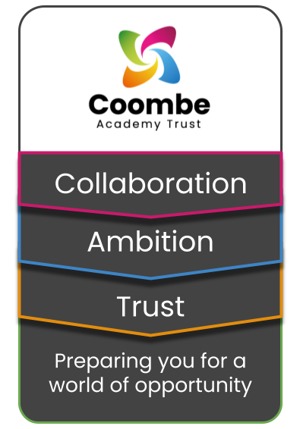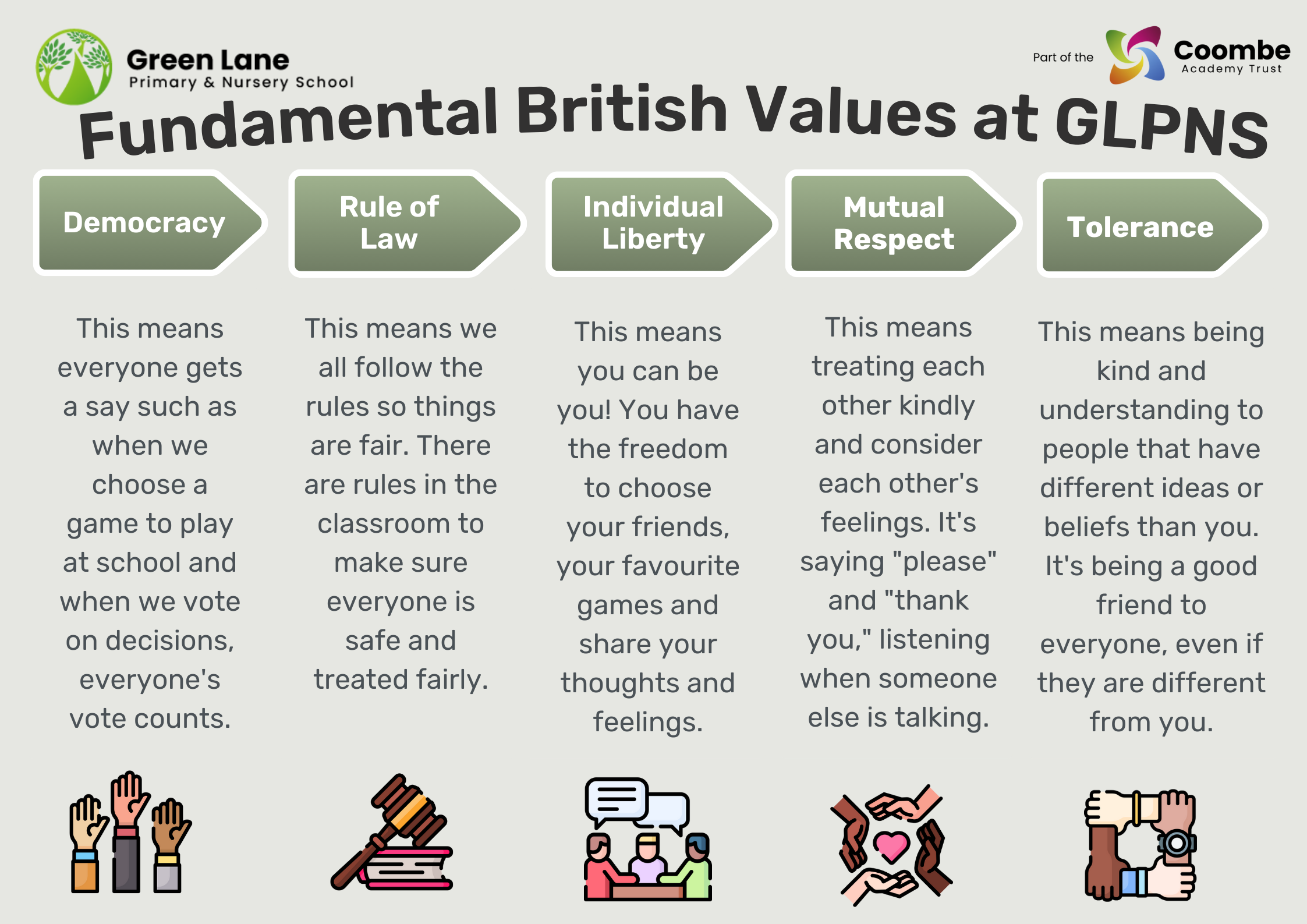At Green Lane our school culture and ethos Nurturing Potential in Everyone is built upon our school values:
- Positive
- Hardworking
- Polite
These values permeate throughout our school and are evident in the resilience we show in the face of challenges, effort we put into our learning and the kindness we show to one another.
We are preparing our pupils to enjoy successful and happy futures: we firmly believe these values equip us all to thrive, irrespective of our life's onward journey.

Coombe Academy Trust is committed to ensuring outstanding leadership at all levels underpinned by the values of Collaboration - Ambition - Trust.
Bespoke professional development ensures lifelong learning for all staff in an environment where success at all levels is recognised and celebrated.
In turn this provides a high standard of inclusive education for our children and young people, one in which their lives are enriched with meaningful opportunities and achieves the best possible wellbeing and academic outcomes.
In short, this ensures children and young people leave Coombe Academy Trust well prepared for their next stage in life and education, and prepares them for a world of opportunity.
British Values at Green Lane Primary& Nursery School

In accordance with The Department for Education, we aim to actively promote British values in our school to ensure young people leave school prepared for life in modern Britain. Pupils are encouraged to regard people of all faiths, races and cultures with respect and tolerance and understand that while different people may hold different views about what is ‘right’ and ‘wrong’, all people living in England are subject to its law.
We actively promote British values in Green Lane Primary and Nursery school.
Democracy – what do we do?
|
|

|
-
Help pupils to express their views, both orally and in writing
-
Provide opportunities for parents, carers, pupils and staff to feedback on aspects of our school and how we can further improve
-
Class voting for rewards and activities to participate in as a class
-
Provide opportunities for pupils to make their own decisions during their free time
-
Teach pupils how to recognise and present both sides of a debate
-
Model how perceived injustice can be appropriately challenged
|
Rule of law – what do we do?
|
|

|
-
Teach our pupils the Rights of a Child as part of the Rights Respecting Schools programme
-
Reading class novels which illustrate the consequences of breaking rules and the benefits of following them
-
Emphasise the importance of our school policies, such as our Safeguarding, Behaviour and Attendance Policies including how they help protect us all
-
Teach our pupils the importance of fairness and the difference between right and wrong at every stage in their development
-
Create our own sets of class rules, which pupils agree to adhere to
-
Require adherence to a staff code of conduct at all times
-
Provide opportunities for pupils to experience ‘rules in real life’ (e.g. through teaching about road safety and cycling proficiency)
-
Teach the importance of rules through our sports curriculum and extra-curricular opportunities
-
Welcome visitors such as the local police to talk to our pupils about how the law is enforced
|
Individual liberty – what do we do?
|
|

|
-
Teach pupils the importance of body boundaries and personal space through our PSHE and RSE curriculum and in assemblies
-
Teach pupils about their rights and responsibilities as part of a Rights Respecting School
-
Provide a broad and rich curriculum which includes participation in creative acts of self expression such as art, dance, music and drama
-
Celebrate achievements in a range of areas to celebrate the unique talents of our community
-
Seek input from pupils, parents, carers and staff on aspects of our school
-
Support our pupils and their families to ask for help and support when needed
-
Adhere to a uniform policy and staff dress code which is inclusive for all
-
Enable our pupils to contribute positively to their local community and beyond
|
Mutual respect – what do we do?
|
|

|
-
Deliver whole school assemblies to explore the protected characteristics of the 2010 Equality Act and to actively challenge stereotypes
-
Reward respectful behaviour in our weekly assemblies
-
Adhere to robust policies and procedures for tackling prejudice, harassment and bullying
-
Teach our pupils about empathy, conflict resolution and communication through our ‘zones of regulation’ programme
-
Incorporate collaborative activities into daily lessons
-
Encourage our pupils to share their voice through our suggestion box, pupil surveys and presenting in assemblies
|
Tolerance for those with cultural differences and beliefs to our own – what do we do?
|
|

|
-
Our RE curriculum provides our pupils with a good understanding and respect for a range of religious beliefs and customs
-
Explore a variety of cultures through the novels we study and stock in our library and the artwork and music we learn about as part of our curriculum
-
Visit different places of worship to help us better understand other faiths and beliefs
-
Welcome pupils and their family members to talk about their personal traditions such as celebrations
-
Support our pupils in being confident to be curious about our differences and to ask respectful questions to find out more
|

